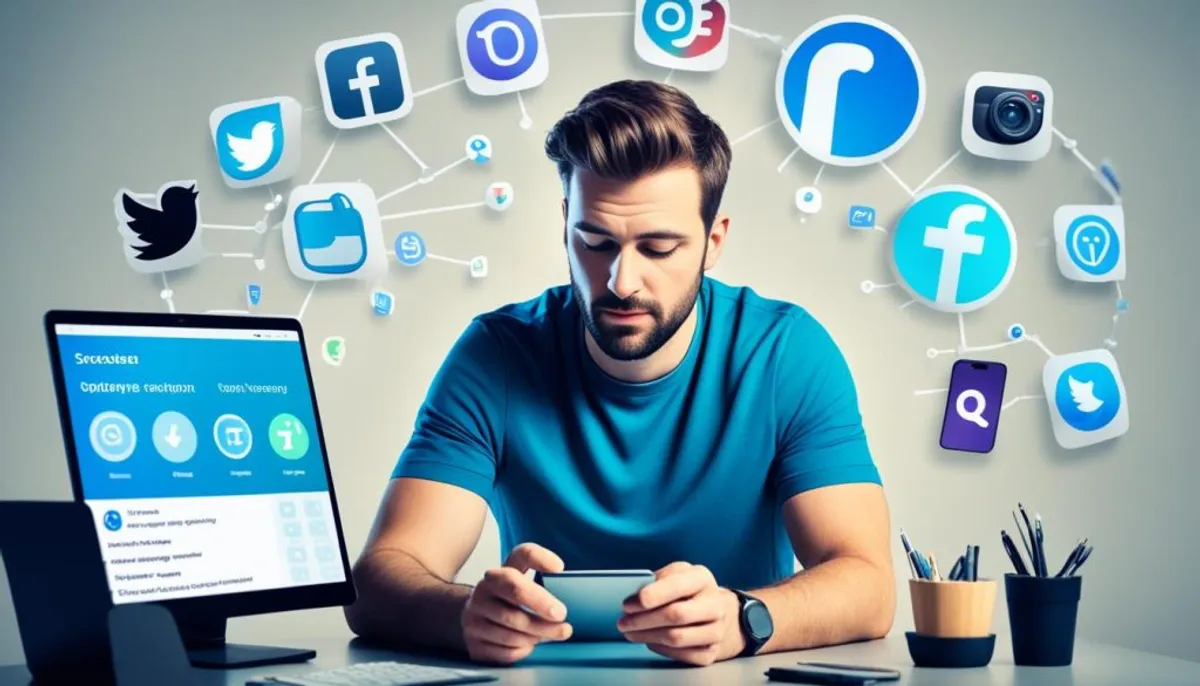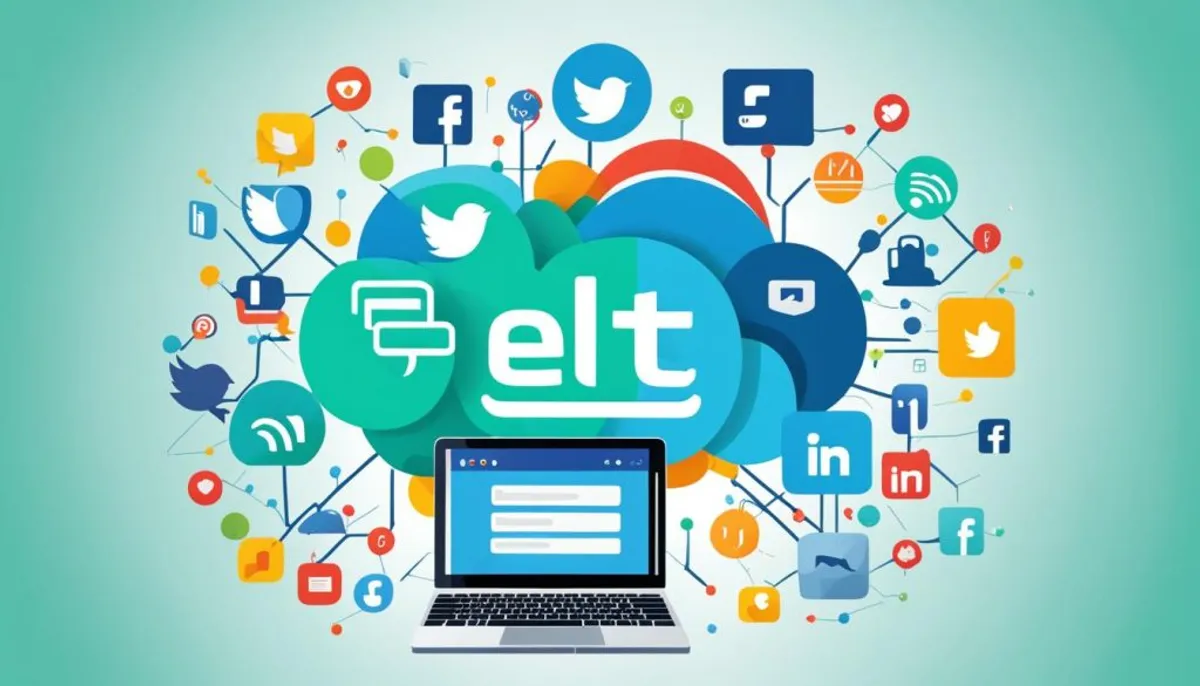In today’s world, social networks and the internet are key parts of our lives. This guide will help you master IELTS exams on these topics. It covers how social media shapes our communication and the wide reach of the internet.
You’ll learn important vocabulary, collocations, and idioms for speaking and writing in IELTS. The guide also looks at the good and bad sides of social media. It includes tips for IELTS listening and speaking, and talks about online manners, digital skills, and social media’s effect on young people.

By the end, you’ll know how to talk and write well about social networks and internet use in IELTS. Start now and discover how to get the IELTS score you want!
Introduction to Social Networks and Internet Usage
In today’s world, social networks and the internet are key parts of our lives. They’ve changed how we talk, share info, and connect with others. Social media trends and digital communication have greatly changed how we talk and interact with the world.
Importance of Social Media in Modern Communication
Social media is now a main way we talk to each other and share info. Sites like Facebook, Twitter, and Instagram let us stay in touch, share our lives, and reach people all over the world. These social networking platforms are vital for sharing ourselves, building communities, and spreading news and ideas, enhancing our digital connectivity.
Global Reach and Impact of Internet Connectivity
The internet has changed many parts of our lives. Online connectivity has changed how we find info, do business, and socialize. With over 4.6 billion people online in 2022, the internet has changed how we talk, work together, and get resources. This has greatly changed our digital communication world, highlighting the importance of using strong passwords to protect our online identities.
As social networks and the internet keep changing, it’s important to see how big a role they play in how we communicate today. They deeply affect our daily lives.
Vocabulary for IELTS Speaking: Social Media
Learning the right words for social media is key for IELTS Speaking test success. We’ll cover important terms, phrases, and idioms used in online chats and social networking.
Key Terms and Phrases
Knowing these terms and phrases is vital for talking about social media:
- Social media platforms – like Facebook, Twitter, Instagram, LinkedIn, and TikTok
- User engagement – how much people interact and take part on social media
- Content creation – making and sharing new content online
- Viral content – stuff that spreads fast and gets shared a lot
- Influencers – people with lots of followers who can influence trends online
- Online privacy – controlling what info you share and how it’s used online
Collocations and Idioms Related to Social Media
Knowing common collocations and idioms can boost your communication skills for ielts when talking about social media and umbrella social networks. Here are some examples:
- To create a social media account
- To build a strong social media presence
- To go viral on social media
- To scroll through one’s social media feed
- To share or post stuff online
- To connect with friends and family online
Getting to know this ielts social media vocabulary will make you better at talking during the IELTS Speaking test.
| Common Social Media Collocations | Example Sentences |
|---|---|
| to create a social media account | I created a new Instagram account last week. |
| to build a social media presence | Many businesses try to build a strong social media presence to reach more customers. |
| to go viral on social media | That funny video went viral on TikTok and was shared thousands of times. |
| to scroll through one’s social media feed | I usually scroll through my Facebook feed during my lunch break. |
| to share or post content on social media | She shared her latest travel photos on Instagram. |
| to connect with friends and family on social media | Many people use social media to stay connected with their loved ones. |
Pros and Cons of Social Media
Social media and the internet are big parts of our lives today. They bring both good and bad sides. It’s important for IELTS candidates to know how technology affects our communication, privacy, and well-being.
Advantages of Social Networks and Internet Use
Social media and the internet have many benefits. They let people connect with friends, family, and communities all over the world. They also give us lots of information and resources for learning and growing. Plus, social media is a strong tool for activism, helping voices of the unheard be heard and bringing people together. Promoting accessibility and inclusivity is essential to ensure that everyone can benefit from these platforms.
Disadvantages and Potential Risks
But, there are downsides to social media and too much internet use. Being addicted to social media can hurt productivity, mental health, and relationships. Cyberbullying and false information spread fast on these platforms, hurting young people a lot. Additionally, social media distraction can lead to decreased focus and efficiency in daily tasks. Also, privacy concerns are big, as our personal data can be at risk.
The effects of social media and the internet on us are complex. Knowing the good and bad sides helps IELTS candidates see the big picture of this important topic.
IELTS Listening Practice: Social Networks and Internet Use
Mastering the IELTS listening section is key to doing well in the exam. In this part, you’ll practice your listening comprehension skills with an audio on social networks and internet use.
You’ll hear about social media trends, internet usage data, and how digital communication affects society. These topics help you get better at IELTS listening practice for social media and internet connectivity.
Getting better at listening comprehension strategies is crucial for IELTS success. This section offers valuable practice and insights. It helps you improve your ability to comprehend, analyze, and respond to audio-based information on social networks and internet usage.
| Key Aspects Covered | Sample Questions |
|---|---|
|
|
By practicing with these IELTS listening exercises, you can improve your skills. You’ll learn to comprehend, analyze, and effectively respond to questions about social networks and internet use in the real IELTS exam.

social networks and internet use ielts
The IELTS Speaking Part 3 often talks about social networks and internet use. It asks candidates to think deeply and show their critical thinking. By learning how to communicate well, you can handle these topics with ease and show off your language skills.
Leveraging Relevant Vocabulary
To do well in the IELTS speaking part 3 on social media and internet use, knowing the right words is key. Learn terms like “social media platforms,” “online communities,” “digital footprint,” and “cyber security.” Use these words in your answers to show you know the topic.
Providing Relevant Examples
Support your points with examples and real-life stories. For example, talk about how social media has changed communication strategies. Mention how Twitter has changed the way people share information and ideas. Real examples make your points clearer and show you can think deeply.
Developing Analytical Thinking
To do well in the IELTS speaking part 3, it’s not enough to just share your thoughts. Show you can think critically by looking at the good and bad sides of social networks and internet use. Talk about how they affect society and make smart comparisons. This shows you can have deep discussions and think critically.
Mastering these strategies will help you handle IELTS Speaking Part 3 questions on social media and internet use well. Understanding the impact of social media popularity is essential as it shapes trends and discussions. Practice often, keep up with trends, and aim to share your ideas clearly and well.
Online Etiquette and Digital Literacy
In today’s digital world, knowing how to act online and being digitally literate is key. We use digital platforms more and more for work and personal life. It’s important to know how to interact well online for both work and personal reasons.
Internet Safety and Cybersecurity
Online etiquette goes hand in hand with internet safety and cybersecurity. The internet can be risky, with threats like cybercrime, data breaches, and online bullying. Understanding these risks and using cybersecurity steps can keep your info safe and make online safer.
Here are ways to improve online manners and stay safe online:
- Talk nicely and think before you post online, and don’t use bad language.
- Keep work and personal online chats separate.
- Keep your data safe with strong passwords, two-factor authentication, and updated software.
- Watch out for links, emails, and downloads that seem fishy.
- Know how to use privacy settings on social media to control your online presence.
- Keep up with the latest in cybersecurity to stay safe.
By following these tips on digital etiquette and focusing on internet safety, you can feel confident online. You can make real connections and protect your online life.
| Digital Etiquette Best Practices | Cybersecurity Awareness Tips |
|---|---|
|
|

Impact of Social Media on Society
Social media has changed how we talk, connect, and get information. It has many benefits but also deeply affects society, especially the young. The use of subtitles in social media is becoming increasingly important for accessibility and engagement. We need to think deeply about how social media shapes our lives.
Influence on Younger Generations
Social media greatly affects the young. Teens and young adults use it a lot. The impact of social media on youth shows in their mental health, social life, and overall happiness.
- Mental Health Concerns: Using social media a lot is linked to more anxiety, depression, and other mental health problems in young people. They feel the need to look perfect online and fear missing out, hurting their self-esteem and feelings.
- Social Dynamics: Social media changes how young people talk to each other. It makes communication easier but also makes cyberbullying, comparing oneself to others, and new social ranks based on online activity common.
- Digital Well-being: Being always online and the constant use of social media can lead to addiction and bad digital habits. This harms young people’s ability to concentrate, sleep well, and do important offline activities for their growth.
We need to understand the real effects of social media on society, especially the young. To protect our online presence, it is essential to promote the use of strong passwords. We must tackle this with education, laws, and promoting healthy digital habits.
Conclusion
As we finish this guide on social networks and internet use for the IELTS exam, let’s think about what we’ve learned. We’ve looked at how digital communication is key in today’s world. We’ve covered the vocabulary, benefits, and risks of social media and the internet.
It’s important to know how to prepare for IELTS topics like social networks and internet use. These topics are getting more common in the exam. By getting to know this area well, you’ll do better in the speaking and listening parts of the IELTS.
Social media and the internet will keep growing in impact, changing how we talk, learn, and decide. As you get ready for the IELTS and after, keep up with the latest in digital communication. This will help you succeed in school and work. By being digitally smart and using the internet wisely, you can handle the modern world well.
RelatedRelated articles



